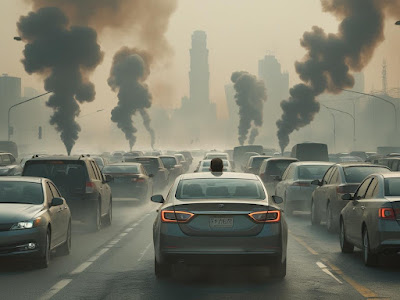10 Daily Habits That Are Harming the Planet (And How to Turn Them Around)
In a world buzzing with climate headlines—flooding in Dubai, blazes in Canada, and record temperatures in India—it's natural to assume the problem lies with massive industries or faraway governments. But what if the problem was? Closer to home?
Our daily routines—mundane, unconscious ones—are destroying the earth more than we know. From how we get around to what we put in our bodies, small decisions have significant implications.
The good news? You can start fixing them today.
Below are the 10 most prevalent daily habits that are destroying the world—and what you can do about them.
1. Single-Use Plastics: Single Use, Permanent Harm
What is wrong?
Plastic bags, bottles, straws, and takeout containers stick around for a few minutes but pollute the planet for centuries. They clog up oceans and kill animals.
Real-World Impact:
The UN Environment Programme (UNEP) reports that more than 11 million tons of plastic are dumped into oceans annually, and this is set to triple by 2040.
Correct It:
- Bring the reusable bottles and bags.
- Employ non-plastic packaging.
- Say no to plastic straws and cups.
♻️ "We have only one planet. Cut back on plastic use—it's a simple action with a gigantic potential impact." — Leonardo DiCaprio
2. Driving Everywhere, Alone
What is wrong?
Private car travel is a major source of carbon emissions. Solo driving aggravates city air pollution and global warming.
Recent Example:
In May 2025, India saw 50°C temperatures in its big cities, mainly due to heat-trapping emissions from vehicles and industries.
Fix It:
- Walk or cycle where you can.
- Use public transport or carpool.
- Consider electric car options.
3. Wasting Water: Every Drop Counts
What's the matter?
Leaving the faucet dripping while brushing teeth or doing dishes wastes clean water, a precious and limited resource.
Cape Town barely avoided "Day Zero" in 2018. Today, in 2025, the same threats of drought are hanging over Mexico City and most of Africa.
Correct It:
- Turn off the taps while not in use.
- Install low-flow showerheads.
- Fix leaks immediately.
4. Fossil Fuel Burning = Electricity Waste
What's the issue?
Using excessive electricity overloads electricity grids and results in additional fossil fuel usage, especially in countries that continue to rely on coal.
Fix It:
- Use LED lights.
- Unplug unnecessary electronics.
- Invest in solar energy whenever you can.
"Act as if your home were on fire—because it is." — Greta Thunberg
5. Food Waste = Climate Waste
What's the issue?
Food waste is sent to the dump, where it decays and releases methane, a greenhouse gas more potent than CO₂.
UN Fact: We throw away 1/3 of the food globally produced, enough for 2 billion people.
Redo It:
- Shop and plan your meals.
- Keep leftovers properly.
- Start composting domestic waste.
6. Buying Fast Fashion
What's the problem?
Fast fashion produces massive amounts of wasted textiles, pollutes water with dyes, and employs labor practices that include sweatshops and the use of plastics.
Climate Impact:
Fashion contributes to 10% of global carbon emissions and is the second-highest consumer of water, according to the UN.
Fix It:
- Buy fewer, better clothes.
- Thrift or donate clothing.
- Promote ethical, sustainable brands.
"Fashion doesn't have to cost the Earth." — Emma Watson
7. Too Much Meat
What's the problem?
Livestock farming occupies vast space in terms of land and water, and cows emit methane, which boosts global warming.
IPCC Report (2024):
Advises plant diets as a leading climate solution.
Correct It:
- Try Meatless Mondays.
- Eat more plant-based proteins and vegetables.
- Support local organic farmers.
8. Dangerous Beauty and Cleansing Agents
What is wrong?
Most soaps, shampoos, and detergents contain microplastics or chemicals that end up in water bodies and destroy aquatic life.
Correct It:
- Select environment-friendly, biodegradable products.
- Avoid harsh chemicals and microbeads.
- Use homemade natural cleaning agents (e.g., vinegar + baking soda).
9. Waste or Wood Burning
What's the issue?
Open burning of waste or wood emits toxic gases and causes poor air quality.
WHO Alert:
Correct It:
- Compost and recycle instead of burning.
- Avoid incinerating plastic and artificial waste.
10. Keeping Quiet
What is wrong?
If individuals keep quiet regarding climate, the momentum is gone. Change begins with awareness and conversation.
Correct It:
Talk about climate with relatives and friends. Share valuable content online. Support actions like Fridays for Future and The Climate Reality Project.
"We are the first generation to feel the impact of climate change—and the last that can do something about it." — Barack Obama????
Conclusion:
Small Changes, Big Results. You don't have to be perfect. But you do have to start. Fixing these 10 habits has nothing to do with polar bears or trees—it's about saving our own homes, health, and future. Home is the Earth. Let's preserve it as if it counts.
















0 Comments